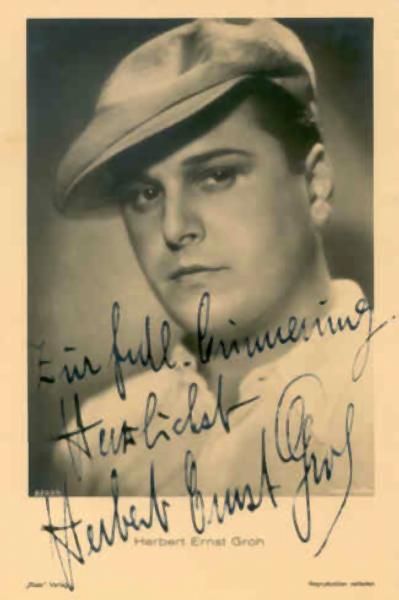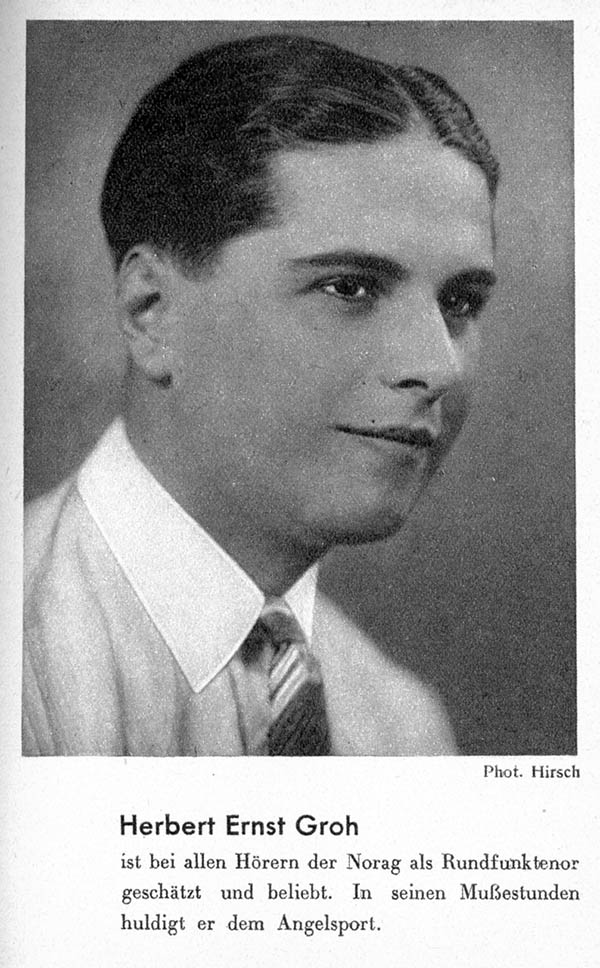Herbert Ernst Groh
Born 1906 in Lucerne (Switzerland), died July 29th, 1982, in Norderstedt (northern Germany). Studied in Zürich and Milano, made his debut in 1927, and sang for a few years at several small and middle-sized opera theatres in Switzerland and Germany.
Whoever tries to digitize a 78rpm Groh record, and to process the audio, will realize what an almost unique voice he had: it was so rich in overtones that even with the early recording technology, the frequencies of his voice reach higher than the hiss of the record groove. It's simply impossible to reduce the noise on a Groh record, without reducing also the spectrum of his voice. That's why you'll hear a lot of 78rpm hiss on the recordings below, and why, the other way round, Preiser's LP and CD reissues of Groh are far less than satisfying: Preiser reduced the noise, but the result is just not Groh's voice.
I would like to thank Thomas Silverbörg for the recordings (Rosenkavalier, Land des Lächelns). Many thanks to Anton Bieber for the Künstler am Rundfunk scan.
Herbert Ernst Groh made over 600 recordings, including opera, operetta, songs and film music. Only his operatic output is reported her. Odeon's phonomontage discs are excluded.
I. Parlophon, Berlin, 1931
133268 Pagliacci: O Columbine B48259-I, O-25123a
133269 Les contes d'Hoffmann: Ha, wie in meiner Seel' B48090-I, O-25104a
133270 Mignon: Leb' wohl, Mignon B48259-I, O-25123b
133271 Les contes d'Hoffmann: Hörst du es tönen B48090-II, O-25104b
with Emmy Bettendorf
133333 La traviata: So hold, so reizend und engelsmild B48147-I, O-25105a
with Gitta Alpár
133333-2 La traviata: So hold, so reizend und engelsmild UNPUBLISHED
with Gitta Alpár
133334 La traviata: O lass' uns fliehen B48147-II, O-25105b
with Gitta Alpár
II. Parlophon, Berlin, 1932
133383 Semiramide: O wär vorbei die Nacht B48164-II, O-25178b
133384 La favorite: Engel so rein B48191-I, O-25110a
133385 Le postillon de Lonjumeau: Freunde, vernehmet UNPUBLISHED
133385-2 Le postillon de Lonjumeau: Freunde, vernehmet B48244-II, O-11918b, O-25499a
133385-3 Le postillon de Lonjumeau: Freunde, vernehmet B48244-II, O-11918b, O-25499a
133511 Stabat mater: Cuius animam (in Italian) B48205-I, O-25081a
133501 Les pêcheurs de perles: Mir träumt von jener Zeit B48191-II, O-26890b
133593 Alessandro Stradella: Wie freundlich strahlt der Tag B48237-I, O-25114a
133594 Alessandro Stradella: Wie freundlich, pt. II B48237-II, O-25114b
133594-2 Alessandro Stradella: Wie freundlich, pt. II UNPUBLISHED
133596 Der Barbier von Bagdad: Sanfter Schlummer UNPUBLISHED
133596-0 Der Barbier von Bagdad: Sanfter Schlummer B48223-I, O-25106a, O-26132b
133604 Der fliegende Holländer: Mit Gewitter und Sturm UNPUBLISHED
133604-2 Der fliegende Holländer: Mit Gewitter und Sturm O-1953a
133605 La forza del destino: In dieser feierlichen Stunde B48229-II, O11990b, O25107b
with Gerhard Hüsch
III. Parlophon, Berlin, 1933
133682 Der Rosenkavalier: Di rigori armato B48244-I, O-25123a, O-26132
133724 Faust: Es ist schon spät O-11938a
with Emmy Bettendorf
133725 Faust: Es ist schon spät, pt. II O-11938b
with Emmy Bettendorf
133725-2 Faust: Es ist schon spät, pt. II UNPUBLISHED
with Emmy Bettendorf
133726 Der Barbier von Bagdad: O holdes Bild O-11954a
with Emmy Bettendorf
133726-2 Der Barbier von Bagdad: O holdes Bild UNPUBLISHED
with Emmy Bettendorf
133727 Der Barbier von Bagdad: O holdes Bild, pt. II O-11954b
with Emmy Bettendorf
133727-2 Der Barbier von Bagdad: O holdes Bild, pt. II UNPUBLISHED
with Emmy Bettendorf
133760 Les dragons de Villars: O schweige still B48279-II, O-25115a
133761 Die lustigen Weiber von Windsor: Horch, die Lerche B48272-I, O-11903
133764 Martha: Ach so fromm B48277, O-25115b, O-25499
133792 Die Meistersinger von Nürnberg: Morgenlich leuchtend B48232, O-11953b
133811-1 Pagliacci: Jetzt spielen O-25014b, O-26890a
133811-2 Pagliacci: Jetzt spielen UNPUBLISHED
133811-3 Pagliacci: Jetzt spielen O-26890a
133812-1 Cavalleria rusticana: O Lola, rosengleich O-11966a
133812-2 Cavalleria rusticana: O Lola, rosengleich UNPUBLISHED
133813-1 Cavalleria rusticana: Schäumt der süße Wein O-11966b
133813-2 Cavalleria rusticana: Schäumt der süße Wein UNPUBLISHED
IV. Parlophon, Berlin, 1934
Be10560-1 Aida: Holde Aida UNPUBLISHED
Be10650-2 Aida: Holde Aida O-25014a
Be10650-3 Aida: Holde Aida UNPUBLISHED
133811-3 Cavalleria rusticana: O Lola, rosengleich UNPUBLISHED? O-26890?
133811-4 Cavalleria rusticana: O Lola, rosengleich UNPUBLISHED
V. Odeon, Berlin, 1935
Be11193-1 Madama Butterfly: Mädchen, in deinen Augen O-25627a
with Maria Cebotari
Be11193-2 Madama Butterfly: Mädchen, in deinen Augen UNPUBLISHED
with Maria Cebotari
Be11194-1 Madama Butterfly: Mädchen, in deinen Augen, pt. II O-25627B
with Maria Cebotari
Be11194-2 Madama Butterfly: Mädchen, in deinen Augen, pt. II UNPUBLISHED
with Maria Cebotari
VI. Odeon, Berlin, 1936
xxB8584-1 Die Zauberflöte: Dies Bildnis O-6990a
xxB8584-2 Die Zauberflöte: Dies Bildnis UNPUBLISHED
xxB8585-1 Die Entführung aus dem Serail: O wie ängstlich O-6990b
xxB8585-2 Die Entführung aus dem Serail: O wie ängstlich UNPUBLISHED
Be11391-1 Serse: Ombra mai fu O-25789b, O-4644
Be11391-2 Serse: Ombra mai fu UNPUBLISHED
VI. Odeon, Berlin, 1937
Be11715 Der Evangelimann: Selig sind, die Verfolgung leiden O-4758a, O-4644
VII. Odeon, Berlin 1938
Be12198 Undine: Vater, Mutter, Schwestern, Brüder O-26254a
Be12199 Der Trompeter von Säckingen: Behüt' dich Gott O-26254b
VIII. Odeon, Berlin, 1939
Be12415 Sadko: Die Südsee birgt in tiefen Felsenhöhlen O-26335a
Be12426 Der Kuhreigen: Zu Strassburg auf der Schanz UNPUBLISHED
xxB8681 Der Kuhreigen: Zu Strassburg auf der Schanz O-7909a, O-3612a
xxB8682 Evgenij Onegin: Wohin, wohin seid ihr entschwunden O-7909b
IX. Odeon, Berlin, 1941
xxB8782-1 Der Kuhreigen: Lug, Dursel, lug O-7971b, O-3612b
xxB8782-2 Der Kuhreigen: Lug, Dursel, lug UNPUBLISHED
xxB8783-1 Zar und Zimmermann: Lebe wohl, mein flandrisch' Mädchen UNPUBLISHED
xxB8783-2 Zar und Zimmermann: Lebe wohl, mein flandrisch' Mädchen O-7971a
xxB8783-3 Zar und Zimmermann: Lebe wohl, mein flandrisch' Mädchen UNPUBLISHED
X. Viennaphon (LP)
Carmen (excerpts) 4005
with Helga Pilarczyk, Ernst Krukowski, Ruth-Margret
Pütz and others
orchestra and chorus of the Städtische Oper Berlin
conductor: Richard Kraus
|

